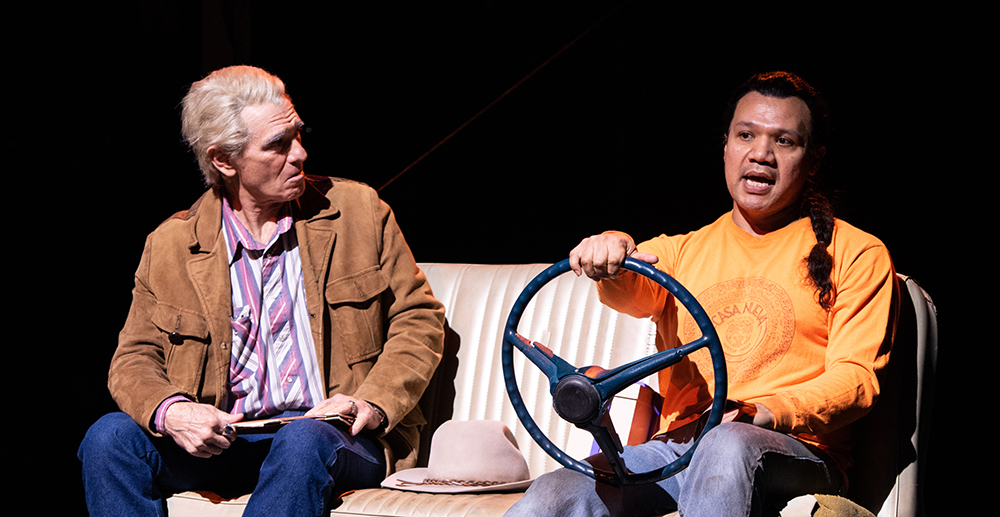Culture
 Mark Murphey (William Joad) and
Mark Murphey (William Joad) and
Playwright Octavio Solis Expands American Narrative With Mother Road
February 13, 2020 @ 12:00am
Mother Road, Octavio Solis’s play-form ‘sequel’ to John Steinbeck’s The Grapes of Wrath, begins several generations after protagonist Tom Joad’s journey from Oklahoma to California. William Joad, a direct descendant of Tom Joad, finds an unexpected heir to the family farm through Martín Jodes, a young Mexican American ex-migrant worker. Mother Road explores complicated themes surrounding immigration, family and survival, as Martín Jodes travels from a migrant farm in California to inherit familial land in Oklahoma.
Playwright Octavio Solis began creating his Grapes of Wrath continuation after traveling Old Route 66, the land that wielded suffering and hope for the original Joad family. Solis encountered an unexpected friend that eventually inspired him to tell the story of Mother Road. The play runs through March 8 at Arena Stage.
“We went down the same path as the fictional Joad family, and I met someone, a young man, at a migrant workers camp near Bakersville, and he was a spoken word artist. He told me, ‘I am the new Tom Joad, and we, the Mexicans, are the new Okies.’ And I said, ‘I have to tell that story.’”
Stereotypes and racism infiltrate Mother Road as William Joad struggles to accept his heir, Martín. Despite it being a hard story to tell, Solis expands the narrative of The Grapes of Wrath to include migrant workers and redefines the concept of American survival and resilience.
“The message I’m trying to put forth with this play is that there’s room for us at the table, not that we’re trying to take the table over. The time has come for some people to move aside so that we can have a seat at the table. And that requires generosity, understanding and empathy on everybody’s part.”
Solis hopes Mother Road will help audience members understand the value of Mexican Americans in society, and emphasized that “[Mexicans] add to the mosaic of the American experience in such a vital, powerful way.”
As a migrant worker, Martín’s story emphasizes inclusion by reshaping the American narrative. Solis crafts a stunning storyline that showcases the goodness of humanity while confronting current American issues.
“I felt like I had Steinbeck there with me in the room. I felt like I had his permission, and I felt a big responsibility to continue the legacy of humanism that Steinbeck brings into his work.”
While chatting with Solis, I asked him what the legendary American author would think of Mother Road. Solis answered without much hesitation.
“I think he would I appreciate that I’m continuing the legacy of pointing out things that are wrong with our society while at the same time pointing out things that make us all one people.”
Solis does more than analyze American and Mexican culture; he makes it his responsibility to include “the lives of the downtrodden, the poor and the under-represented,” and helps their voices gain strength, which he believes Steinbeck would respect.
Mother Road reinvents a modern-day Joad family, but the story is consistent with Steinbeck’s original structure. Characters make the inverse journey from California to Oklahoma, acquiring new members and, unfortunately, losing some along the way.
“In The Grapes of Wrath an entire clan of Joads piles into one vehicle and as soon as they set out, bad things start to happen. [In the end], Rose of Sharon’s baby is stillborn and it’s the final blow to this family. Even the future dies at the end of the book.”
However, Solis does not let the story terminate here. Many generations down the road, when Martín begins the journey of his ancestors, the story gains traction and hope.
“In [Mother Road], the story starts with one person, and then two. They head East in the opposite direction, and they start building a family. They even bring back the bones of the dead with them. They build a new family, a family that is different from The Grapes of Wrath. And I think this is the thing Steinbeck would appreciate the most.”
Mother Road enjoys its first East Coast run at Arena Stage through March 8. Tickets are $115. For more information, click here.
Arena Stage: 1101 6th St. SW, DC; 202-488-3300; www.arenastage.org







